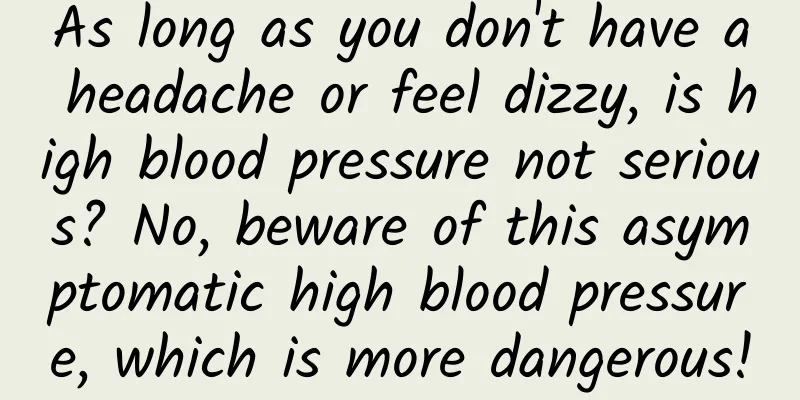As long as you don't have a headache or feel dizzy, is high blood pressure not serious? No, beware of this asymptomatic high blood pressure, which is more dangerous!

|
gossip "As long as you don't have a headache or feel dizzy, your high blood pressure isn't serious" Since you don't have any headaches or dizziness, your high blood pressure shouldn't be a big deal. You don't need to worry or seek treatment. Rumor Analysis This is a rumor. Among patients with hypertension, only a small number will experience headaches and dizziness. Hypertension without symptoms is more dangerous. Many people think that since they don't feel headaches or dizziness, it shouldn't be a big deal if their blood pressure is a little high. In fact, high blood pressure doesn't always make people feel obviously uncomfortable. It is often called the "invisible killer" because it may quietly affect your body without you noticing. The absence of symptoms does not mean that your blood pressure is within a safe range, but that your body has not yet issued a "warning signal." Among patients with hypertension, only a few people will experience headaches and dizziness. Studies have found that only about 13.6% to 24% of patients with hypertension will experience headaches, and only about 7.4% to 14.2% will experience dizziness. Copyrighted stock images, no reproduction is authorized Long-term high blood pressure will gradually damage blood vessels, heart and other organs. Patients who do not experience headaches or dizziness may have no symptoms, or they may have chest tightness, chest pain, palpitations, nausea/vomiting. Therefore, the absence of headaches and dizziness does not mean that their health is not threatened. Hypertension threatens multiple organs If high blood pressure is not controlled for a long time, it will have a profound impact on multiple organ systems throughout the body. Even if there is no obvious discomfort, organs such as blood vessels, heart, kidneys, eyes, and brain are slowly suffering from the damage caused by high pressure, which may eventually lead to serious complications. Copyrighted stock images, no reproduction is authorized First, high blood pressure increases the risk of cardiovascular complications and causes damage to the heart, kidneys, brain, and blood vessels. Multiple mechanisms work together to accelerate the chronic damage of high blood pressure to multiple important organs, which may eventually lead to serious consequences such as heart disease, heart failure, kidney failure, stroke, and retinopathy. Why is it more dangerous if there are no symptoms? Many people think that high blood pressure is fine if there are no symptoms. In fact, this idea is very dangerous. High blood pressure without symptoms is often more hidden, but it still harms the body. However, because there are no symptoms, many people ignore the importance of blood pressure control. French researchers followed up 1,914 hypertensive patients for 30 years and found that hypertensive patients with headaches had lower all-cause mortality and cardiovascular mortality than hypertensive patients without headaches. From reference [4] Headache can serve as a warning symptom, reminding patients of the presence of hypertension, causing them to seek medical help more frequently and be more willing to follow the doctor's advice to manage their blood pressure. However, although hypertensive patients without headache symptoms have a worse long-term prognosis, hypertensive patients with headaches are at greater risk of target organ damage in the short term. Therefore, it is crucial for hypertensive patients to maintain long-term stability and healthy management of blood pressure, regardless of whether they have symptoms or not. How to manage high blood pressure properly? The key to managing high blood pressure lies in two aspects: lifestyle adjustment and drug management. Develop good habits in daily life, keep an eye on blood pressure levels, and prevent problems before they occur. 1. Eat a healthy diet The first is lifestyle adjustment, which is also one of the most basic and effective ways to manage blood pressure. Maintaining a healthy diet is the top priority. Reducing salt intake and increasing foods rich in potassium, calcium and magnesium, such as vegetables, fruits and low-fat dairy products, can effectively help control blood pressure. Salt intake should be strictly controlled, not exceeding 6 grams per day, and you need to pay attention to the hidden salt in snacks and condiments. 2. Exercise appropriately Exercise is also an important part. Moderate aerobic exercise, such as brisk walking for 30 minutes a day, can significantly lower blood pressure and improve cardiovascular health. At the same time, keeping your weight within a healthy range is also very important for controlling blood pressure. Obesity increases the burden on the heart and makes high blood pressure problems more serious. Therefore, a healthy diet combined with regular exercise can not only help manage blood pressure, but also improve the overall quality of life. 3. Rational use of drugs The second is drug management. For some patients with high blood pressure or difficult to control through lifestyle, drug treatment is necessary. Many people worry about drug dependence or side effects, but it is not the antihypertensive drugs themselves that prevent them from stopping taking the drugs, but high blood pressure; it is because we cannot completely defeat high blood pressure, so the helpers (antihypertensive drugs) we invited cannot leave. It should also be noted that patients with asymptomatic hypertension should not lower their blood pressure sharply, as this may lead to adverse events such as myocardial infarction or stroke. When using medications, be sure to follow the doctor's orders and do not increase or decrease the dosage or stop taking the medication at will. Some people think that they can stop taking medication once their blood pressure is normal, which is actually very dangerous. Hypertension is a long-term chronic disease, and drug control is a continuous process. Sudden discontinuation of medication may cause blood pressure rebound and even cause serious cardiovascular events. 4. Monitor blood pressure regularly In addition, regular blood pressure monitoring is also an important part of managing hypertension. Many people usually only rely on blood pressure measurements during physical examinations. In fact, regular self-monitoring at home can better understand your blood pressure fluctuations. Measuring blood pressure at the same time every day and recording the results can help doctors evaluate treatment effects and adjust drug dosages. Copyrighted stock images, no reproduction is authorized In short, the correct management of high blood pressure requires long-term persistence. Through lifestyle adjustments and drug treatment, blood pressure can be kept within a healthy range. Do not wait until symptoms appear before taking action. Daily prevention and control are the key to avoiding serious consequences. Regular physical examinations, a healthy diet, moderate exercise, and standardized medication are all effective ways to protect yourself from the harm of high blood pressure. Looking in the mirror of rumors The human body is a complex system. Some hidden dangers are often not easy to detect but will slowly affect multiple organs. By the time symptoms appear, they may have entered a more serious stage. Therefore, it is recommended that you develop the habit of caring for your body, have regular check-ups, and actively communicate with your doctor, so as not to ignore the hidden dangers in your body. References [1]Middeke M, Lemmer B, Schaaf B, et al. Prevalence of hypertension-attributed symptoms in routine clinical practice: a general practitioners-based study. J Hum Hypertens. 2008;22(4):252-8. [2]Kowalski S, Goniewicz K, Moskal A, et al. Symptoms in Hypertensive Patients Presented to the Emergency Medical Service: A Comprehensive Retrospective Analysis in Clinical Settings. J Clin Med. 2023;12(17):5495. [3]Kućmierz J, Frąk W, Młynarska E, et al. Molecular Interactions of Arterial Hypertension in Its Target Organs. Int J Mol Sci. 2021;22(18):9669. [4]Courand PY, Serraille M, Girerd N, et al. The Paradoxical Significance of Headache in Hypertension. Am J Hypertens. 2016 Sep;29(9):1109-16. [5]Gauer R. Severe Asymptomatic Hypertension: Evaluation and Treatment. Am Fam Physician. 2017;95(8):492-500. [6] Chinese Hypertension Prevention and Treatment Guidelines Revision Committee, Hypertension Alliance (China), Hypertension Branch of China Medical Health International Exchange Promotion Association, etc. Chinese Hypertension Prevention and Treatment Guidelines (2024 Revised Edition). Chinese Journal of Hypertension (Chinese and English). 2024;32(7): 603-700. Author: Jiang Yongyuan, Master of Internal Medicine, Third Military Medical University Reviewer: Tang Qin, Director of the Science Popularization Department of the Chinese Medical Association, National Health Science Popularization Expert |
Recommend
What causes menstrual headaches? Are your headaches severe?
Women feel uncomfortable during their menstrual p...
Ovulation test paper positive before menstruation
Women use ovulation test strips to check the time...
How to relieve menopause
Women's menopause generally lasts about 2 to ...
Can soaking your feet help you sleep and lose weight? Huaxi experts say these 4 types of people really shouldn’t soak their feet!
It's the beginning of spring, but the weather...
What are the methods for treating uterine erosion?
Speaking of cervical erosion, I believe that many...
How long is the head and arm of a three month old fetus?
A woman's pregnancy period is divided into th...
How do astronauts sleep in space? What is the principle of human sleep?
Sleeping is an indispensable physiological phenom...
What is wrong with maldevelopment during pregnancy?
Many pregnant women will keep a cheerful mood dur...
Women's menstrual period health care learn ten ways to be a healthy woman
During the menstrual period, women are physically...
What is the cause of small bumps on the vulva?
A happy life stems from healthy physical conditio...
How to deal with children's dizziness
Have you ever felt dizzy? Do you know why we feel...
Mild lower abdominal pain
Most female friends may have experienced lower ab...
What causes breast pain?
Breast is a very important part of the human body...
Angel Song~
This is the 4793th article of Da Yi Xiao Hu You c...
The most effective exercise for tightening your hips after childbirth
Many mothers are troubled by the same problem, th...









